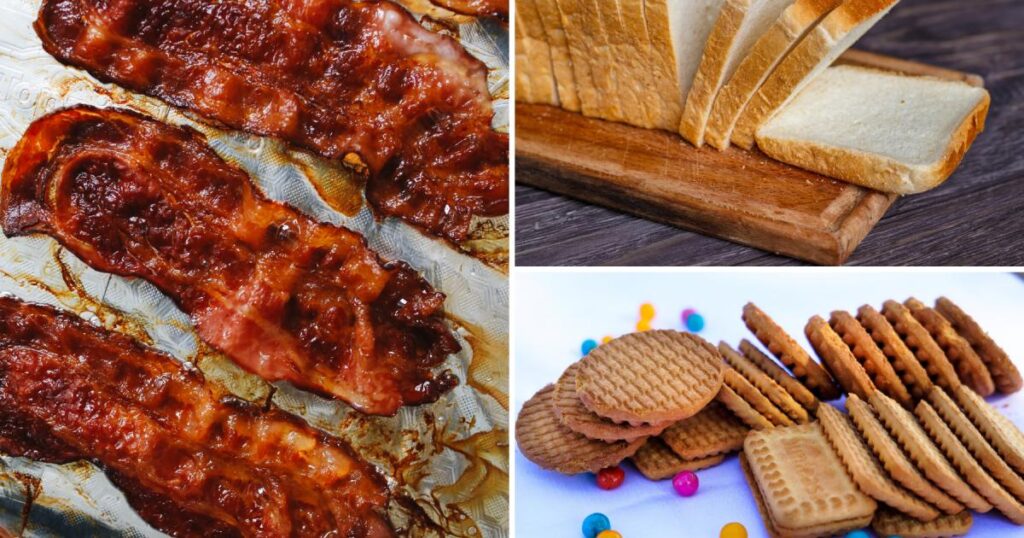The nutritionist Federica Amati has revealed a number of items she recommends avoiding as well as alternatives to them.
Amati has discussed not eliminating UPFs completely from your diet, citing baked beans and Weetabix as examples where they contain benefits like being fibre-rich.
However, what’s arguably more important is the amount of UPFs that make up a diet.
She explained: “High intakes are linked to poorer health, but lower intakes — usually 15 per cent of our calorie intake — are not.
“Alarmingly, in the UK more than 65 per cent of our calorie intake is from UPFs. But if you go to Italy, where I am from, it’s 14 per cent. This is what we need to aim for, and it’s doable.”
What UPFs are replacing in our diets is also crucial, as Amati says a lack of wholegrains is a leading factor in diet-related diseases.
Amati’s full recommendations can be found on The Times website here.
Nutritionist shares the ultra-processed foods to avoid
Bread
Amati shares that many ‘healthy’ loaves are low in fibre and contain additives to keep them soft and fresh.
She adds: “Look for breads with more than 6g fibre per 100g and avoid anything with more than 5g sugar per 100g.
“Rye, pumpernickel, flaxseed, spelt and buckwheat breads are high in fibre and contain a variety of wholegrains, polyphenols (micronutrients) and “good” fats that support health.”
Pasta
A lot of quick-cook white pasta has “little nutritional value” according to Amati, while pasta-based ready meals should definitely be avoided.
Even many supermarket-stuffed fresh pastas, such as ravioli, have a high salt content and contain emulsifiers.
She recommends looking for Durum wheat or spelt pasta if possible as it is much higher in protein.
Biscuits
Any biscuits with a long shelf life should be kept to the bare minimum as they have a “laundry list of emulsifiers, unhealthy fats and other chemicals”.
Additionally, Amati says that rice cakes “lack any nutritional benefit” so oatcakes would be the best way to go.
Ice Cream
Amati shares that nearly all brands of ice cream contain emulsifiers and additives so there are very few ‘healthy’ options.
She adds: “You can now buy high-protein and reduced-calorie ice cream but don’t be fooled — this is not the best way to get high-quality protein in your diet and the ingredients lists of these options are often worse.”
Snacks
Lentil and hummus chips may seem like a healthy snack on paper but are made with “a variety of industrial ingredients”.
Instead try out items like lightly salted popcorn, roasted chickpeas or seaweed thins.
Amati adds: “If you do want crisps, pick ones that still resemble a sliced vegetable and are fried in extra virgin olive oil.”
@uktoday_ Experts warn what happens when don’t wash these fruit and vegetables #uknews #fruitandveg #foodpoisoning #uknewsheadlines ♬ original sound – UKToday 🇬🇧 Newsquest
Cereals
Amati only recommends eating breakfast cereals occasionally, with high-fibre and low-sugar content.
Ideally, there’ll be less than 5g per 100g of sugar and the fibre count should be above 6g per 100g.
She adds: “Cereal is better paired with fresh fruit, nuts and yoghurt. The same goes for muesli and granola as most varieties have a high sugar content.”
Meat and fish
If you want to enjoy a ham sandwich Amati recommends buying the meat sliced from a whole-cooked ham in the butcher’s.
This will be healthier than from a supermarket where processing and preservatives have been involved.
Additionally, more than one serving of bacon a week will increase your risk of cancer, so it might be one to reduce.
In terms of fish smoked salmon is high in salt and potential preservatives, so options like mackerel and sardines are better.
@uktoday_ Are there benefits to drinking red wine? I happily found out. 🍷 #uknews #redwine #winetimе #uknewsheadlines ♬ original sound – UKToday 🇬🇧 Newsquest
Cheese
Amati recommends avoiding reduced-fat versions of supermarket cheese as they are highly processed to remove the fat.
Cheese spreads should be avoided for similar reasons.
She adds: “Cheese that is traditionally made and left to mature is rich in nutrients like calcium, iodine and potassium.”
Milks and yoghurts
Flavoured yoghurts should be avoided due to “a concoction of stabilisers, emulsifiers, sugar and flavourings”.
Unflavoured whole yoghurts and kefir for live probiotic strains that support gut health are the best according to Amati.
Recommended reading:
She adds: “If you drink plant milk for ethical reasons choose oat or soy, but there isn’t a huge health benefit in switching away from dairy. Adults don’t need milk, but a splash in your tea is fine.”
Sweet treats
Many muesli snack bars and protein “fitness” bars are marketed as a healthy treat but are full of sugars, artificial additives and emulsifiers, Amati says.
She adds: “I eat a couple of squares of dark chocolate most days. Minimally processed dark chocolate that’s at least 70 per cent cocoa can support your health.”
Source link
[Featured]
[Just In]





